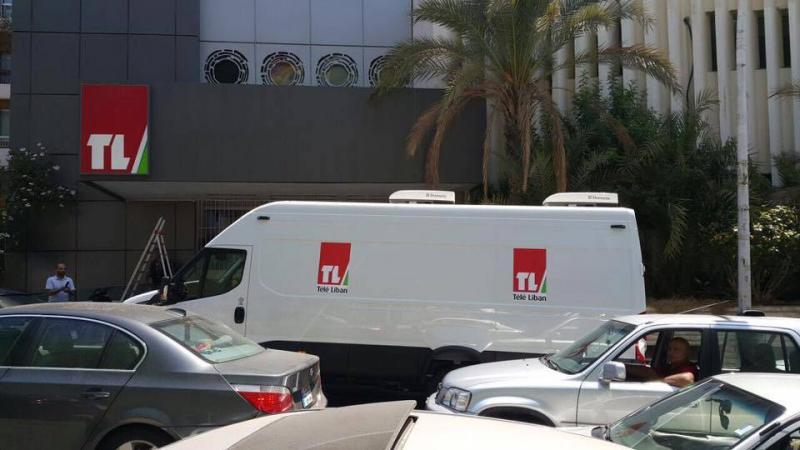For over six decades, Lebanon's television has established a leading media space in the Arab world, witnessing some of the most brutal internal Lebanese conflicts, especially during the civil war, which forcibly divided the station into two but did not close it down. In the post-war years, with the rise of private TV stations and the sectarian distribution that the sector underwent, Lebanon's television found itself at a significant financial disadvantage due to the substantial neglect from successive governments.
The economic crisis exploded in 2019 affecting all public and private institutions, with the public sector suffering most, and Lebanon's television bearing the brunt of this. A strike was announced a few days ago following a series of warning actions, demanding equal treatment with other public sector institutions regarding salaries and allocations. Today, Minister of Information Ziad Makari unexpectedly announced the suspension of the station's broadcasts, later clarifying in a subsequent statement that the television was not closed, criticizing steps taken by Maria Shadiac, the head of the television employees' union, who in turn responded by rejecting any interruption in broadcasting.
It seems that the situation is more complex than it appears, and divisions may arise in the coming days, especially since today marks the first day without the evening news broadcast.
**Makari's Decision:**
Minister of Information Ziad Makari, acting in a caretaker government, issued a statement saying, "To mitigate the ongoing confusion, after several false reports attributed to my office claiming I made a decision to permanently close Lebanon's television, which is completely unfounded." He added, "I want to clarify the following: For the sake of public money, I decided to freeze broadcasting due to the persistent insistence of Ms. Merna Shadiac, the newly appointed head of the television employees' union, to stop program broadcasts and use the public screen solely to air statements issued by her, an act that incurs significant unforeseen costs to the state treasury, such as the diesel needed for the station."
He further noted that "the decision to continue the strike, as taken by Ms. Shadiac, reveals a lack of understanding of how administrative matters operate, especially since I had informed members of the union council about the details of my actions and the measures and decisions I had implemented for their benefit in a short time frame, including obtaining a financial advance from the cabinet worth 70 billion Lebanese Lira to settle overdue debts accumulated over the years, including health insurance for the television employees and their families."
He emphasized, "Since assuming the management of Lebanon's television, I have made strenuous efforts to ensure the overdue financial rights since November 2021. The Minister of Finance transferred a cash advance decree to the cabinet worth 16 billion and 8444 million Lebanese Lira. Notably, Shadiac made her decision to suspend work after being informed of the Finance Minister's decision to grant Lebanon's television employees social aid, with the approval of the Audit Committee on August 3, 2023, which raises more than one question mark about the reasons and backgrounds of the strike decision."
Makari also mentioned, "It is worth noting that I secured a decision from the cabinet in its meeting held on May 4, 2023, equating the employees of Lebanon's television with other public sector workers, which resulted in securing four salaries for television employees for the months of May, June, and July of 2023 continuously."
He stressed, "It is important to point out that a significant number of Lebanon's television employees, and all company directors except for the technical director and the head of transmission centers, signed a petition asking me to make every effort to maintain work at Lebanon's television contrary to the decision of some union members and the head. I affirmed my support for every step to return Lebanon's television screen to every home, and I thank the head of the General Labor Union Dr. Bishara Asmar for his efforts in promoting the interest of this public facility and its employees."
After the return of broadcasting, the Minister of Information expressed profound gratitude to "the employees of Lebanon's television, the union members, and the directors who revitalized the national television screen and resumed work within it." He stated, "We pledge to continue every step that guarantees the rights of Lebanon's television employees and work to restore its role in anything that will protect and fortify the national station."
**Response from the Employees' Union:**
In response to Minister Makari, the union of television employees stated: "The Lebanese public, and especially the employees of Lebanon's television, were astonished by Minister of Information Ziad Makari's decision this morning to suspend broadcasts of the state television in response to the employees' rightful strike, protesting their failure to receive their dues since 2021 until today. The union, which is mandated to protect the employees' rights and interests, categorically rejects any interference with Lebanon's television broadcasting and holds full responsibility for anyone making such an unjust decision against the national screen. After the union was inclined to suspend the strike as a goodwill gesture despite only receiving a small part of their dues, they were surprised by the strange escalation from Minister Makari, who demanded a complete cessation of broadcasts and no disbursement of funds until the strike was lifted first."
The union addressed the minister: "Your Excellency, we are not strike enthusiasts, and the issue with you is not personal; rather, the problem lies in our failure to obtain our rights for over two years. To portray it as a conflict among managers is far from the truth. The union, which emphasizes that its only motive is to protect employees' rights, asserts its intention to continue the strike and values the unity and solidarity demonstrated by the employees in preserving their rights and safeguarding their screen."
**Shadiac's Remarks:**
Following the minister's response, Merna Shadiac, the head of the television employees' union, addressed the minister, stating: "Until late Thursday night, your appointees (having not communicated with us directly) contacted us, and we proposed not to stop broadcasting. As soon as some of our pending dues that are in the bank are paid, we will suspend the open strike."
Shadiac pointed out in a statement, "We initiated a meeting to issue a statement to suspend the strike, but there was no reply from the parties concerned, and the response came this morning by stopping the broadcasts."
She clarified, "Regarding the recent characterization of being new to union work, it should be asked of those unfamiliar with union decisions that are made by consensus or majority, not individually by the head. Instead of focusing on the union and its president striving hard to achieve the employees' and the television's interests alike, it would have been more appropriate to address administrative matters that ensure employees' rights, thereby eliminating the need for a strike altogether."
**Rights... and Politics!**
According to sources directly connected with Lebanon's television issue, they stated that "the political dispute in Lebanon has targeted the state television." The station's broadcasts were completely cut off today, the screen filled with colored lines, and archival material that had been aired for a week was missing, occurring since the employees decided to strike in protest against delays in paying their overdue rights for 22 months.
At the same time, a source in the Ministry of Information confirmed to us that Minister Ziad Makari's decision was intended to pressure the employees to resume work and accept what the government offered them. However, offering three months' salaries out of 22 months is insufficient to cover their debts for basic necessities, as they had received salaries ranging from 1.5 million to 5 million Lira during all this time, while the assistance recently approved by the government, which averaged five additional salaries for the public sector, was withheld.
**Disagreement Among Employees and the Union**
According to exclusive information to us, employees are discussing the decision they will make, with some refusing to resume work without full payment of their dues, while others demand guarantees, commitments, and a timeline for the payment of overdue amounts. As of now, no decision has been made, and the state television screen remains off.
A source in the Ministry of Information revealed, "More than 60 employees signed against the Lebanon Television Employees Union, and two individuals have resigned from the union." There remains a significant disagreement among them, although their demands are unified, but differing political affiliations fuel internal conflicts.
Sources expressed concern that this could lead to an uncertain future for the state television, one of the oldest television stations in the Arab world and the Middle East, which has thousands of rare recordings of politicians and artists dating back to the 1960s.
**Asmar's Statement**
Bishara Asmar, the president of the General Labor Union in Lebanon, stated, "Employees of Lebanon's television have been among the most wronged and oppressed over the decades compared to public sector employees in Lebanon." The delay in applying social assistance and raising cost of living allowances for these employees exacerbated their suffering and complicated their economic and social conditions.
He said, "As a union, we stand with them and support their legitimate movements until they achieve their rights. The owed financial rights are now ready for implementation thanks to the commendable efforts of the Minister of Information and the cooperation of all those involved in facilitating their receipt, starting with Minister of Finance Youssef Khalil, Director General of the Ministry of Finance George Maarawe and President of the Audit Bureau Judge Mohamed Badran."
He called on "the brothers in the union of Lebanon's television employees to give an opportunity to implement what was agreed financially and to resume work, and to initiate immediate constructive dialogue with the Minister of Information to obtain their full rights and restore Lebanon's television to its former glory."
**Public Reaction**
Additionally, many journalists, media professionals, and actors expressed their refusal to close this national channel: Journalist Sami Kleib commented on the platform "X" (Twitter), saying, "Instead of lamenting over Lebanon's television, which we pride in its grand history, I suggest that each of us journalists contribute a free program lasting from a quarter to half an hour, with the proceeds and advertisements going to the television, and we help it, provided that the sectarian mafias do not interfere. These should be programs related to the uplift of society, not to expanding the rifts of strife."
Similarly, actress Carmen Lebbos wrote, "You can only do this to the homeland... greetings to the homeland." She accompanied the tweet with a video in which she criticized shutting down the television that represents the memory of the homeland and society.
Moreover, actor Naim Halawi tweeted: "Turning off the national screen means turning off the memory of the homeland, goodbye... Lebanon's television."
For her part, journalist Mona Abou Hamze remarked on the platform "X," indicating that "the general deterioration extends to the national screen, and all depositors' money has not sufficed to cover the salaries of its employees."




